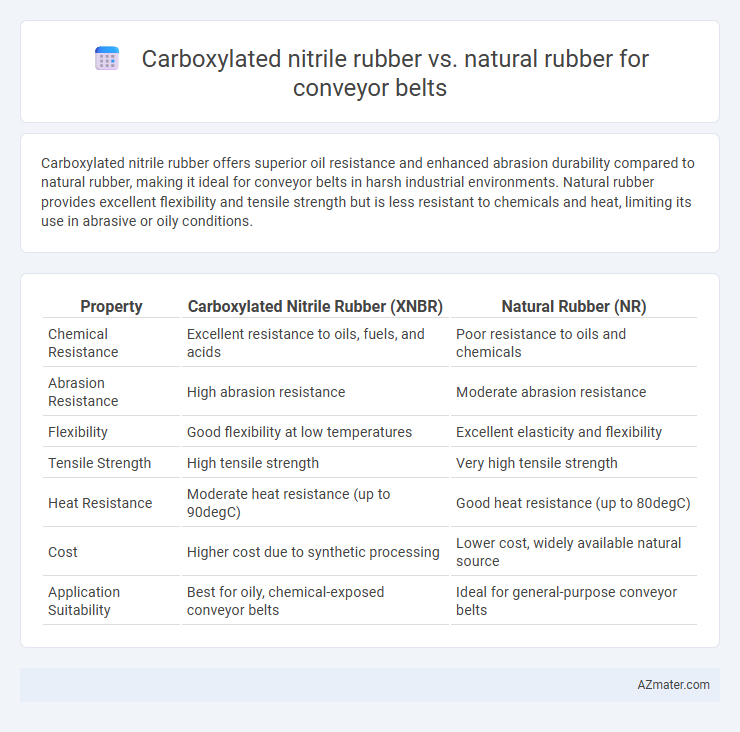Carboxylated nitrile rubber offers superior oil resistance and enhanced abrasion durability compared to natural rubber, making it ideal for conveyor belts in harsh industrial environments. Natural rubber provides excellent flexibility and tensile strength but is less resistant to chemicals and heat, limiting its use in abrasive or oily conditions.
Table of Comparison
| Property | Carboxylated Nitrile Rubber (XNBR) | Natural Rubber (NR) |
|---|---|---|
| Chemical Resistance | Excellent resistance to oils, fuels, and acids | Poor resistance to oils and chemicals |
| Abrasion Resistance | High abrasion resistance | Moderate abrasion resistance |
| Flexibility | Good flexibility at low temperatures | Excellent elasticity and flexibility |
| Tensile Strength | High tensile strength | Very high tensile strength |
| Heat Resistance | Moderate heat resistance (up to 90degC) | Good heat resistance (up to 80degC) |
| Cost | Higher cost due to synthetic processing | Lower cost, widely available natural source |
| Application Suitability | Best for oily, chemical-exposed conveyor belts | Ideal for general-purpose conveyor belts |
Introduction to Conveyor Belt Materials
Carboxylated nitrile rubber (XNBR) offers superior oil resistance, abrasion resistance, and tensile strength compared to natural rubber, making it ideal for conveyor belts used in harsh industrial environments. Natural rubber provides excellent flexibility and elasticity but lacks the chemical resistance required for handling oils, fats, and chemicals commonly encountered in manufacturing and mining sectors. Selecting XNBR for conveyor belts ensures longer service life and reduced maintenance costs in demanding applications where exposure to aggressive substances is frequent.
Overview of Carboxylated Nitrile Rubber (XNBR)
Carboxylated nitrile rubber (XNBR) is a synthetic elastomer known for its superior chemical resistance, high tensile strength, and excellent abrasion resistance, making it ideal for conveyor belt applications in harsh industrial environments. Unlike natural rubber, XNBR exhibits enhanced oil, fuel, and solvent resistance due to the carboxyl groups in its molecular structure, which improve crosslinking and durability. These properties enable XNBR conveyor belts to maintain performance under extreme temperatures and exposure to aggressive substances, extending service life and reducing maintenance costs.
Characteristics of Natural Rubber
Natural rubber offers excellent flexibility, high tensile strength, and superior abrasion resistance, making it ideal for conveyor belts requiring durability and resilience. Its natural elasticity enables it to absorb impact and resist tearing under heavy loads, ensuring long service life in demanding material handling environments. Despite its susceptibility to degradation from oils and chemicals, natural rubber maintains excellent grip and traction, crucial for conveyor belt performance.
Key Differences Between XNBR and Natural Rubber
Carboxylated nitrile rubber (XNBR) offers superior oil and chemical resistance compared to natural rubber, making it ideal for conveyor belts in harsh industrial environments. XNBR's enhanced abrasion resistance and increased tensile strength provide greater durability and lifespan under high-stress conditions. Natural rubber excels in flexibility and impact resistance but lacks the chemical resistance and temperature tolerance that XNBR delivers.
Abrasion Resistance Comparison
Carboxylated nitrile rubber (XNBR) exhibits superior abrasion resistance compared to natural rubber, making it highly suitable for conveyor belts exposed to harsh, abrasive environments. The enhanced cross-linking and chemical structure in XNBR provide better wear resistance and longevity under continuous friction and mechanical stress. Natural rubber, while flexible and resilient, tends to wear faster on rough surfaces, resulting in more frequent maintenance and replacement cycles.
Chemical Resistance and Durability
Carboxylated nitrile rubber (XNBR) exhibits superior chemical resistance compared to natural rubber, particularly against oils, fuels, and solvents, making it ideal for conveyor belts exposed to harsh industrial environments. Its enhanced durability stems from improved abrasion resistance and tensile strength, resulting in a longer lifespan under mechanical stress. Natural rubber offers excellent flexibility and resilience but degrades faster when exposed to chemicals, limiting its use in chemically aggressive settings.
Temperature Performance Analysis
Carboxylated nitrile rubber (XNBR) offers superior temperature resistance compared to natural rubber, operating effectively within a range of -40degC to 120degC, which makes it ideal for conveyor belts exposed to extreme temperatures. Natural rubber exhibits excellent elasticity but has a more limited temperature range, typically performing well only from -50degC to 70degC, leading to potential degradation under high heat. The enhanced heat aging resistance and thermal stability of XNBR ensure longer service life and reduced maintenance costs in temperature-critical conveyor belt applications.
Cost Effectiveness and Availability
Carboxylated nitrile rubber (XNBR) offers superior oil resistance and durability for conveyor belts, making it more cost-effective in industrial settings with exposure to chemicals and abrasive materials. Natural rubber provides excellent tensile strength and elasticity but is generally less resistant to oils and chemicals, leading to higher maintenance costs in harsh environments. Availability of natural rubber is widespread and often more economical upfront, while XNBR's production depends on synthetic processes, potentially increasing initial costs but reducing long-term expenses due to enhanced performance.
Application Suitability in Conveyor Systems
Carboxylated nitrile rubber (XNBR) offers superior oil and abrasion resistance compared to natural rubber, making it highly suitable for conveyor belts operating in harsh industrial environments with exposure to oils, chemicals, and abrasive materials. Natural rubber provides excellent flexibility and tensile strength, ideal for conveyor systems requiring high elasticity and impact resistance, particularly in dry or less chemically aggressive conditions. The choice between XNBR and natural rubber depends on the conveyor system's operational demands, where XNBR excels in durability under chemical exposure and natural rubber delivers enhanced performance in elasticity and wear under moderate environments.
Conclusion: Choosing the Right Rubber for Conveyor Belts
Carboxylated nitrile rubber (XNBR) offers superior oil resistance, abrasion durability, and temperature stability compared to natural rubber, making it ideal for conveyor belts in harsh industrial environments. Natural rubber provides excellent elasticity, flexibility, and resilience, which benefits applications requiring high tensile strength and good grip on conveyed materials. Selecting the right rubber hinges on application-specific factors such as exposure to chemicals, operating temperatures, and mechanical stress, with XNBR favored for heavy-duty resistance and natural rubber preferred for flexibility and impact absorption.

Infographic: Carboxylated nitrile rubber vs Natural rubber for Conveyor belt
 azmater.com
azmater.com